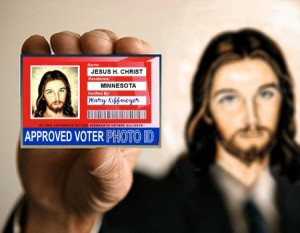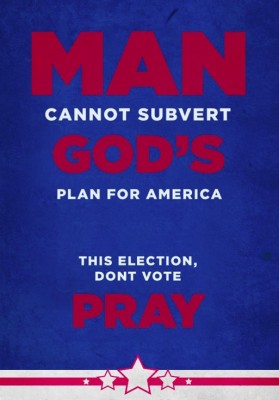 I am not asking, “Who would Jesus vote for?” That question has been beat to death.
I am not asking, “Who would Jesus vote for?” That question has been beat to death.
Instead, I am asking the more basic question: “Would Jesus even vote?”
I believe He would. But before I explain why, let us look at two of the arguments some Christians give for NOT voting.
I know most of the arguments for why some Christians say that we should not vote (see, for example, this book: Electing Not to Vote), and I understand their concerns, but I think that most of these arguments are invalid. Here are two examples:
Voting for Evil
Some say that a vote for “the lesser of two evils” is still a vote for evil.
Well, of course. But unless the candidate is Jesus Christ, you will always be voting for the lesser of two evils.

But note that even when we do not vote, we still vote in other ways. Voting is one way of supporting your chosen candidate, but so is paying taxes, using government services, attending school, and supporting our military. Anything that the government does for you, and which you make use of, is a form of affirming and supporting the governmental system that we have. If you do not like the governmental system that we have, then it is your responsibility to help change it. And even if you are successful in changing it, it will still not be perfect, but will be the “lesser of two evils.”
Voting is a Cop-Out
Some Christians say that rather than try to change the world by voting in a flawed candidate, what Jesus really wants is for us to get out into the world and be the change we want to see.
Such an argument is a straw man. I agree that voting is not enough, but I also doubt that there are any Christians who seriously think that they can change the world for the better simply by casting a ballot. But although voting by itself will not change the world, it does not follow that we should not vote. Voting is one of the many available methods by which we can share our opinion and have some small influence on the world.
There are numerous other reasons some Christians give for not voting, but I think that these two examples reveal my basic framework and perspective on voting.
Why Would Jesus Vote?
Jesus never discussed voting partly because voting was not an option in the Roman Empire. But there were other questions which people asked about the role of God’s people in supporting the government. They wanted to know, for example, if they should pay taxes to Caesar. And Jesus said “Yes. You should pay taxes to Caesar.”
Paying taxes, of course, provides way more support to the government than casting a ballot ever will. Since no government is perfect, some of the tax money will always go to support some sort of evil. But Jesus said to pay it anyway.
Furthermore, much like John the Baptist, Jesus was critical of some of King Herod, and I believe that if Jesus has been given the opportunity to vote for a new king, Jesus would have voted for someone who would do a better job of obeying God’s law, upholding biblical values, and protecting the innocent and weak. No candidate will do these things perfectly, but some candidates will definitely do such things better than others.
Voting isn’t going to change the world. Only people can do that. But voting is one of the available means by which we can do the good we know we ought to do.
While our responsibility to this world does not stop with voting, it definitely does not stop short of voting either.
This post is part of the October Synchroblog, a group of bloggers who write every month about various topics. This month we are all writing about “Faith and Politics.” Below is a list of the other contributors to this topic. Go check them all out and interact with them in the comment sections of their posts.
- We The People by Wendy McCaig
- Pulpit Freedom, Public Faith by Carol Kuniholm
- Plumbers and Politicians by Glenn Hager
- Conflating Faith and Politics by Maurice Broaddus
- You Cannot Serve Two Masters by Sonja Andrews
- A Kingdom Not Of This World by Jareth Caelum
- I am a Christian and I am a Democrat by Liz Dyer
- 5 ways to make it through the election and still keep your friends by Kathy Escobar
- Why There’s No Such Thing As The Christian Vote by Marta Layton
- God’s Politics? by Andrew Carmichael
- Faith and the Public Square by Leah Sophia




“We will always be voting for evil” … if we wish to endorse evil. Plainly, we are not required to do so … yet.
The only thing necessary for the triumph of evil is for good men to do nothing.
Edmund Burke
There is no authority that is not put in place by God
Romans 13:1
Jews were to obey God’s law in Israel, and in other lands, they were to obey the laws of the land, still they were generally not given dispensation to not keep the 613 Mitzvoth outside of Israel, unless to save a life, and even this has limits…. (ie you can not murder one party, simply to save the life of another or your own. (please understand that murder has a meaning in Hebrew, as it does in English which is different to “Kill”))
So Jews were to obey the laws of Caesar outside of the Holy Land, but no human law takes precedence in the Holy Land. Certainly not Caesar’s
Jesus maintains maintaining the Laws of the Torah:
His statement in Matth. 5:17: “Think not that I have come to abolish the law and the prophets; I have come not to abolish them but to fulfil them.” This leaves nothing to the imagination: Jesus does not break with the Torah. On the contrary, His highest ambition, as a Jew who is faithful to the law, standing in the tradition of His people, is to fulfil the Torah – even its smallest details: the jot and the tittle; the smallest punctuation mark and the smallest letter. The whole composition of the Torah must remain intact, as it were; every letter and every punctuation mark are of significance. The Torah is significant as long as creation stands: every jot and every tittle in the law remain in force as long as heaven and earth exist, until everything has been fulfilled (verse 18).
Now Jesus is put into an apparently difficult position of insulting Judaism or Caesar, and gives a truly Talmudic answer:
“And they offered him a denarius. And Jesus saith to them: Whose image and inscription is this? [21] They say to him: Caesar’s. Then he saith to them: Render therefore to Caesar the things that are Caesar’s; and to God, the things that are God’s.
The Denarius, literally belonged to Caesar. The Jews had already long been fighting a “Taxation” revolt for at least 13 years. Jesus could not support paying taxes to Caesar, without being seen to be on Caesar’s side, instead of on Israel’s side. But Jesus confounds everyone, because h inspects a coin which literally is the property of Caesar’s. this in not paying taxes, this is ” Render therefore to Caesar the things that are Caesar’s;” and doesn’t offend Israel or Jewish Law, (Halacha).
So Jesus is not supporting payment of Taxes, any claim that he is , is totally superficial thinking ignoring all of Judaism and Christianity.
Nor is Jesus going to vote: he has not come to be involved in the triviality of Human politics, but in preparing us for the End of Times, and the world to come.
Anyone who claims to know Jesus’ that is God’s preference for an earthly political candidate is completely arrogant, pretending to have a direct line to the mind of God that others do not, and that God takes side in the imperfection and corruption of political elections.
I suggest that we don’t need to answer the question about ; would Jesus vote.
I heard a story about a Muslim man who wanted to eat watermelon, he didn’t know whether Mohammed ate watermelon including seeds and all or discarded the seeds, so this fellow would not eat watermelon on the grounds that he couldn’t be sure of the prophet’s example.
I think the question of Jesus voting is a similar speculation and irrelevant.
The scripture tells believers to be subject to the authorities ( 1 Peter Ch2 )
Isn’t Christianity about history, it is about something that has happened, something that has been done, not a philosophy concerned with applying “Jesus hypotheticals” to mundane procedures.
What has historically happened is that Jesus has redeemed us and has risen from the dead. Let’s keep our eyes fixed on that.
Where in the Bible does Jesus say “yes pay your taxes.”
I like your article on voting. I think it is important to the body of christ.